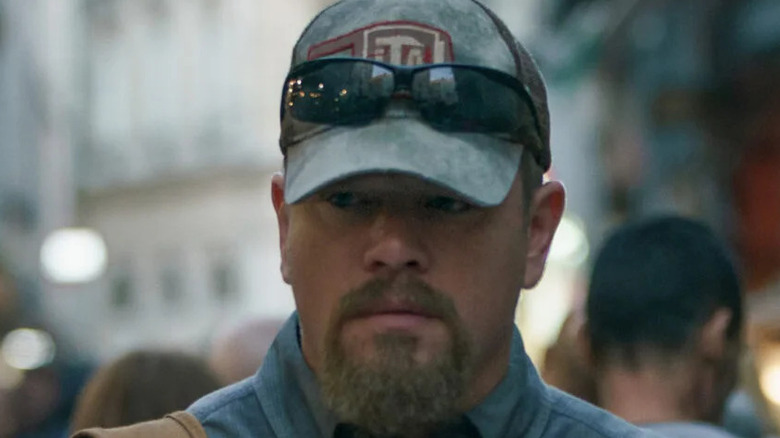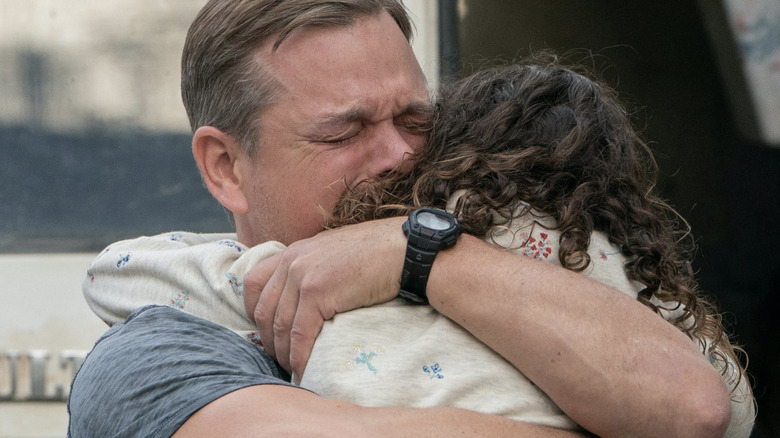Stillwater Review: Star Wipe
In the newest season of the excellent film podcast "The Plot Thickens," there's a moment when Morgan Freeman finds himself at a crossroads. Having just been Oscar-nominated for "Driving Miss Daisy," he suddenly finds himself in high demand, cast in an overblown Hollywood movie hemorrhaging money (the infamous "The Bonfire of the Vanities"). Fascinating audio from the late '80s set has him realizing that at age 53, his days of toiling in obscurity may finally be dwindling — and that might not be a good thing.
"My agent said to me, you're getting to a level where you have to be careful," Freeman says. "If you become a movie star, you won't have to act anymore."
The quote is insightful of an actor's mindset as fame eclipses craft, but it's also relevant in the context of "Stillwater," a wonderful character-driven drama starring one of the biggest movie stars on the planet, Matt Damon. Over the past three decades, Damon has made plenty of fine films, but has often felt like he was trying to shed his movie star albatross. Now he finally has. It's a transformative performance in a film that stars an actor, not a movie star.
The drama is loosely based on the real-life story of Amanda Knox, but if you aren't familiar with that name you're best off not Googling it. Taken solely on its own merits, "Stillwater" is a film that will make your heart break, make you consider intrinsic flaws in the human condition, and make you appreciate both the quiet moments and the profound ones.
Written and directed by "Spotlight" filmmaker Tom McCarthy, the film opens with a beautiful shot of Damon's Bill Baker standing in the middle of a home. As the camera pulls back, it reveals that this house has been destroyed by natural disaster, with Baker among a crew of clean-up workers. The moment turns out to be symbolic of Baker's own life, as any pretense of "family" was destroyed long ago, and he has been left in the rubble, trying to pick up the pieces.
But Bill is a good ol' boy from Oklahoma, the kind of guy who only removes his ball cap to pray and grew up speaking when spoken to. He's not the type of person who spills his guts in a big, weepy speech — so the film wisely peels this onion bit by bit, doling out his tragedies, shortcomings, and perhaps foolhardy aspirations.
Prisoners
Chief among these is getting back to France, where his daughter Allison (Abigail Breslin, in another exceptional performance) is serving time for allegedly murdering her college girlfriend. As the film begins, a lot of time is spent depicting the fish-out-of-water Bill, navigating a world where he sticks out like a Sonic Drive-In on the front lawn of the Eiffel Tower. He is determined to find the real killer and free his daughter. "Okay," you might think at this point, "the story beats coming up feel obvious, but this might be a film worth watching."
What really elevates "Stillwater" is that, much like the character of Bill, every time you think you've got a handle on things the unfolding story shifts. Most significantly (and enjoyably), Baker spends so much time in the city of Marseille that as the months pass he befriends a bleeding-heart artist named Virginie (an excellent Camille Cottin) and her eight-year-old daughter Maya (Lilou Siauvaud), forming a will-they/won't-they partnership that has him requiring a translator and her in need of a father figure for young Maya. Later shifts in the film feature Allison's fractured relationship with her father, and of course the necessities of bringing the true killer to justice.
But there is no "one-armed man" in this movie. It's not as simple as finding the bad guy and pointing him out to the French police. Pounding the cobblestone pavement and dishing out "ma'ams" as he flashes photos at uninterested passers-by, Bill becomes a pathetic character, chasing multiple ghosts who are forever outside his grasp. As his daughter likes to remind him, theirs is a family that has always screwed things up — and this story might not have a happy ending.
Father figures
The greatest compliment you can give someone like Matt Damon, it seems, is to say that there are long stretches of "Stillwater" when you forget you're watching Matt Damon. The role certainly has a uniform for him to rely on — ball cap, sunglasses on the brim, goatee, plaid shirt tucked into his jeans — but it doesn't offer Damon any prosthetics to hide behind, no fake noses or old age makeup. Nevertheless, he renders himself unrecognizable at times through a mixture of body language, studied speech, and tiny details that really make the character feel so authentic. His shoulders alone deserve an Oscar nomination — Damon frequently buries his head between them, projecting a standoffish attitude to these foreigners while simultaneously bearing all the weight of a life built on bad choices.
Equally impressive — and perhaps battling the aforementioned Morgan Freeman struggle in equal measure — is Abigail Breslin. In some ways, it's always painful to see a child awarded an Oscar nomination, as she was for 2006's "Little Miss Sunshine." As wonderful a performance as it was, the recognition stripped her of anonymity and its accompanying versatility, all when she was barely ten years old. Now 15 years later, Breslin shows how far she has come as an actor, disappearing into the role of a world-weary young woman whose hope is vanishing before our eyes. It announces her as an adult talent worth watching, rather than a former child star.
This is a movie that has plenty of noise, but after the credits unspool the scene you're left with is the most quiet one: Bill, sitting on the couch alongside Virginie, with Maya at their feet. Without a single word, the three actors portray a newly formed family. As the audience watches, a series of glances and revealing grins depicts Maya, Bill, and Virginie each making the realization that at that moment, in silence, they have found happiness together — and their looks reflect the uneasy hope that it will last.
McCarthy shoots the film in a very unvarnished, pragmatic fashion that makes it almost feel like a documentary. Of course, no camera could follow this man into the moments we see in the film, but it nevertheless seems to disappear, revealing key moments of intimacy that feel like they're naturally unfolding before our eyes. The French backdrops depict a vicious underbelly behind the romance, and an uncaring populace content to lock up an outsider.
"Stillwater" is a fascinating film, one with the pretenses of a movie like Costa-Gavras' 1982 "Missing," the 2007 Angelina Jolie drama "A Mighty Heart," or the 2013 Denis Villeneuve thriller "Prisoners," but about something completely beyond simply finding someone. It feels more closely related to the most recent revival season of "Twin Peaks," in that it follows a detective on a seemingly well-intentioned quest, but is actually about a foolhardy man whose black-and-white ways may be clouding the realization that the battle was lost long ago, that the rules were changed on him without notification, and that he can never go back to the way things were.


